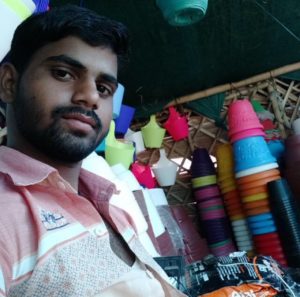Some people used free time during the pandemic to challenge themselves. They proved it’s never too late to learn a good thing and adversity is an opportunity
Thanks to the pandemic, the life we were accustomed to stands disrupted. But that’s not all bad. People need a break from the monotony of a predictable life and the pandemic has given them just that. A break from the “rat race” says Ritu Singh, a homemaker who helps her husband in exports.
Ritu graduated from the Kirori Mal College in the late 1980s and worked for a while before she married the love of her life after a short courtship. Their families were not supportive of the marriage and she insists on using her maiden surname. Her husband, Atul, did very well in business and gives the credit to her steadfast support. Mother of two young men, both pursuing higher studies in the US, she is fairly certain that they will settle abroad. Faced with the typical empty nest syndrome, she says the vacuum she felt in her life was only exacerbated during the lockdown.
Ritu has always been high on life and didn’t want to get into a self-pity mode where “you celebrate your own miseries.” Though she holds her children responsible, to an extent, for her feeling ignored at a stage in life when she needs “more care”, she doesn’t want to embarrass them in public.
“They are a big part of my life—my sons—and now they seem to have gone. I don’t blame them, but there was a point in time when I blamed myself for being the victim — an emotional fool.” This is not a good feeling and she wanted to distract herself. And the bid to distract herself resulted in rejuvenating her spirits.
This is how it happened. Ritu was visiting her sons in the US during the summer of 2018. She made friends with the Diaz family of Spanish origin. One of their daughters was in a serious relationship with her younger son. She liked the Spanish language—the phonetics of it — and made up her mind to learn the language, one of the many things in her bucket list that she was fairly sure she won’t accomplish.
She started taking online lessons—Duolingo, a language learning website—and purchased some textbooks as well. “I like learning new things. Despite being fairly regular, I was never really serious about it,” she says.
This changed during the lockdown. A distraction strategy, the learning of a new language became a passion.
By the end of May, she could hold a conversation in Spanish, about day to day things. She felt the need to find people she could converse with in Spanish. She contacted the Diaz family—though her son had since broken up with their daughter. The Diazs were thrilled to have a conversation in Spanish with her. They meet twice a week for an hour to discuss society, religion, rituals and customs. They are friends now and she plans to visit Spain with them when things get better.
“My son doesn’t even know that I’m in touch with the Diaz family. And that we have travel plans. I don’t seek their approval nor do I want to embarrass them. They are busy with their things. I’m busy with mine.” She refuses to share a picture.
Ritu is not an exception. People are trying new things. Online dance classes attract all age groups. Rekha Singh, 61, who recently retired from a demanding corporate job, is now learning Kathak online, describing it as “a date with my own hidden self.” And there are advantages, “It’s a good way to keep in shape without venturing out of the house. I now understand dance is an expressive language.”

Avi from Nagaland who lives with her boyfriend in East Delhi, is skilled at crochet, makes soft toys using bright thick yarn. She is very good at it, but still honing her skills, says, “I’m not ready to showcase my work—perhaps in a month,” she adds.
Some enjoy cleaning the house, while others have taken a liking for creating an indoor garden. Vishwanath, from Bihar, has a nursery in Sector 137, Noida. “More and more people are buying plants (since the pandemic started) and the rates have actually gone up,” he confesses. One of his clients has helped him go online to market his plants. He has also created a WhatsApp group of prospective customers—some 500 of them–and he keeps sending them the pictures of new plants–with their common and biological names.

One of his clients, to whom he sells plants at half the rate, is helping him create a website. Vishwanath has already roped in two of his friends with bikes and provides free home delivery of plants in the neighbourhood.
Sanjay Tiwari, in his mid-50s, is an entrepreneur, living with his poetess mother, is the father of a son and a daughter. His son, Apoorv, is pursuing PhD in advanced physics in Zurich, and married a mathematician from Basque in a dream wedding that took place in Kerala this January. A birder by hobby, Sanjay is also a budding photographer and a traveller. He had a lot of free time since he stopped going to the gym and is spending less time at work.
He begins by saying, “How much can you watch Netflix?” He was keen to utilise the “extra time” to hone his talent as a photographer. What can you do inside an apartment? He decided to set up a studio of his own in one of the bedrooms of his Vasant Kunj flat. He has equipped himself with screens and lights—backlight, light projector, spotlight, and so on.
“In the past, I have always shot in natural light,” he says. So, the pandemic gave him the time and mind space to become technically proficient to use artificial lighting for photography. It added a whole new dimension to his craft.
He explains the inverse-square law that basically says a specified physical quantity is inversely proportional to the square of the distance from the source of that physical quantity. “It applies to both sound and light,” he clarifies. Lately, he’s interested in capturing bodyscapes, and his photography has seen a profound change, is experimental, diverse and a visual delight. He can easily give professional photographers a run for their money.
“Mahamari ne meri zindagi badal di,” says Vishwanath. He means it in a positive sense. Sanjay, Rekha and Ritu would concur. And they have proved that it’s never too late to learn a good thing and adversity can be an opportunity.
(Cover: Sanjay Tiwari–when he went fishing before the pandemic hit)





